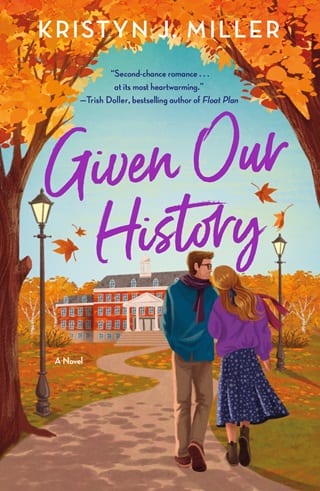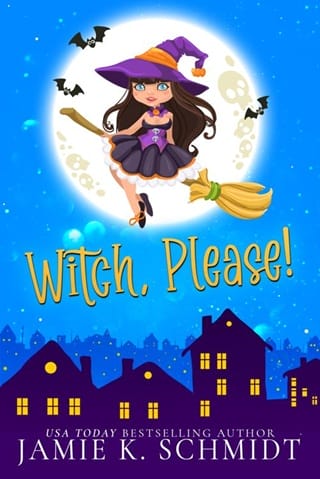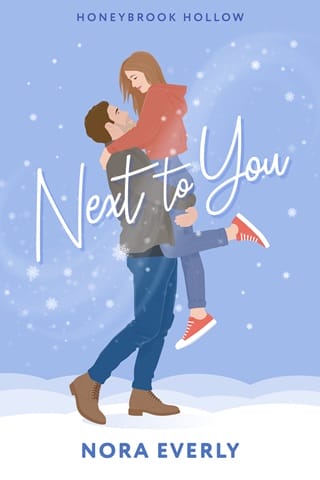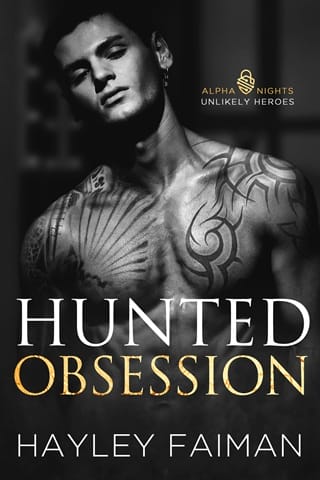Chapter 5
CHAPTER
5
SEVENTEEN YEARS AGO
“Have you drawn your numbers yet?”
Ms. Fischer, the camp director, jiggled a plastic Planters Peanuts container full of folded slips of paper. She was wearing one of those dorky hats that covered her neck and khaki shorts that revealed legs mauled by mosquitos. I shoved my hand into the half-empty container and withdrew a number. Izzy followed suit.
I unfolded my slip of paper as Ms. Fischer shuffled away. Number six. “What number did you get?” I asked Izzy, still holding out hope that we’d be paired up.
“Thirty-one. You?”
“Not thirty-one.” I chewed the inside of my cheek and scanned the crowd. Campers milled around us in the grass, awaiting further instruction. It was a sweltering day for late September, sticky enough that the sky-blue Appalachian Adventure Camp polos clung to everyone’s skin like Saran wrap. The winners of the three-legged race got a two-liter of Pepsi and a whole pepperoni pizza to split. Not much motivation for utterly humiliating ourselves, but after an entire month of choking down tuna salad and deli sandwiches that were drier than the Sahara, it might as well have been a crab dinner sprinkled in Old Bay.
Unfortunately, my dermatologist had made me swear off dairy for a few months in hopes that it might help clear up my skin, so that meant I couldn’t have any pizza. I had little reason to try to win this race, and I already would have preferred to be inside beneath the air-conditioning, so it was only half-heartedly that I flashed my slip of paper at faces I knew and faces I didn’t. “Six? Anybody have six?” The nice thing about assigned partners like this was that it got around the embarrassment of having to ask people to pair up with me, but the process of trying to find whoever drew the same number was still awkward. I spied Brandi, the girl who’d been assigned to the bunk above me that summer, and I shouldered my way past a group of older kids to get to her. “Do you have six?”
With a mournful shake of her head, she flashed me a two.
“Darn,” I said, standing on tiptoe to look for anyone else I might recognize. “Maybe—”
“Did I hear you say you’ve got six?” someone asked behind me.
I turned. There was a slight delay before I recognized him—he looked different without his glasses. Indoors, his eyes were dark brown, but in the sun they were a bright, warm amber, like holding a bottle of maple syrup up to the light. “It’s you,” I said, perking up slightly.
“Me,” Teddy agreed, holding up a scrap of paper with a six scrawled on it.
We hadn’t interacted since the rain let up two weeks ago. In part because—weather permitting—the camp program was chock-full of activities to keep us busy, but it also seemed like that day in the cafeteria had been a matter of convenience. After all, we’d both spent last September at camp as well, but we didn’t interact then, so why would we interact now? Our promise of friendship might have fallen by the wayside, had we not drawn the same numbers for the three-legged race.
“My stride will be quite a bit longer than yours,” Teddy was saying, arms folded as he eyed my legs, “so I’ll have to slow down a bit, and it might help if you lengthen yours.”
I didn’t have the heart to tell him that I had little interest in winning a pizza I couldn’t enjoy. “Physical activity isn’t really my strong suit,” I said instead. In the distance, a whistle chirruped and someone called for us to line up.
“I’ll count our paces out loud, if that helps,” he offered as we crested the grassy knoll, where the cabin leaders had already set to work binding participants’ legs together. “That should make it easier to stay on the same page.”
“Sounds good,” I muttered. I wasn’t sure counting would be all that helpful. I was plenty competitive when it came to board games and trivia. Less so when there was athleticism involved. We stood side by side, our feet positioned close to one another as we waited for one of the cabin leaders to come tie us together. “Do you like pizza?” I asked.
He shot me a quizzical sidelong look. “Pizza’s all right, I guess.”
Ms. Fischer materialized again and gave us a long, scrutinizing look as she measured out the ribbon in her hands. “Stand closer,” she barked.
I was already too aware of the space—or lack thereof—between us. Being tied together would have been embarrassing even if we were friends, but despite our promise, we barely knew each other. Without looking at Teddy, I pressed in close, hoping I didn’t smell as sweaty as I felt. Ms. Fischer crouched to bind our legs together, then ordered us to wait for the signal and moved on to the next pairing.
Teddy shifted on the spot—whether because he was uncomfortable or impatient, I couldn’t tell. “Stop bumping me,” I said.
“I’m sorry.” He tried to adjust and nudged me with his elbow in the process. “I don’t know what to do with my arm.”
“Just put it around my shoulder,” I suggested without really thinking. “Isn’t that how this is supposed to work?”
He raised his eyebrows. He plainly took more time to think things through than I did, but he seemed to come to the same conclusion, because he tucked me beneath his arm. I’d never had a boy put his arm around me before—it was surprisingly heavy, and now I wasn’t sure what to do with my arm, so I slipped it around his back like some of the other campers were doing, heart thumping in anticipation of the race.
Did this guy even sweat? He wasn’t half as sticky as me.
“Campers ready?” someone shouted, and all of the teams hurried to make last-minute adjustments to their respective strategies—shifting arms and frantic, tangled limbs. Teddy’s arm tensed around my shoulder, as though to say don’t you dare try to switch things up last minute.
“This leg will be number one.” He patted our bound legs—our thighs, actually, and for some reason, the touch caught me so off guard that my heart leapt into my throat, but he didn’t seem to notice. “These are number two.” He indicated his free leg.
“On your mark.”
“Ready?” Teddy asked.
“Get set.”
I fixed my gaze on the finish line at the bottom of the hill. “As ready as I’m going to be.”
“Go!”
The whistle trilled and everyone took off at once. Half the campers stumbled and ate dirt right out the gate. It took a couple paces, but Teddy and I managed to find a sort of rhythm, all to the tune of his muttered one, two. The finish line was marked by a chalk line sprayed across the grass at the bottom of the hill, not that far away. We picked up speed with ease thanks to the slope of the hill.
Maybe too much speed.
“One, two. One, two—no, that’s not two, this leg is two,” Teddy protested, trying to indicate our legs while also trying to keep walking.
“What do you mean?” I was breathless, flustered. “That’s your left leg, this is my left leg, they’re both two.”
“That makes no sense. If they’re both two then we wouldn’t—”
He went to take a step with every intention of dragging me along with him, and he sort of did drag me. But I had already lost my footing, my free leg buckling beneath me—followed by a sickening pop. We went down in a blur of arms and legs bent at awkward angles and sky-blue polo shirts, landing face-first in the grass with a dull thud.
I let out a muffled groan. There was a bitter tang in my mouth and I tried to spit it out, grass sticking to my lip. Teddy’s arm was heavy across my back, but he shifted to push himself off the ground. I sucked in a breath as a sharp, biting pain shot through my ankle.
He froze beside me. “Are you all right?”
“No,” I gritted out. “I think I broke my ankle.”
My face was scrunched in pain, my eyes shut tight, too scared to assess the damage. Teddy shifted himself gingerly in the grass, and then deft hands worked to untie our legs. As soon as I was free, I rolled onto my back and lifted my injured leg to reposition it, hissing at another twinge of pain. The sunlight was a dull red against the inside of my eyelids.
All around us, people were shouting and cheering at the race and whistles were chirruping. No one seemed to have noticed that we were down—or rather, if they did notice, they hadn’t noticed that I was injured. “Hey!” Teddy was shouting, too, far closer than the rest of the din. Footsteps thudded in the grass. “We need to get her to the first aid station.”
Someone was squatting next to me. “Can you walk?” A gruff voice that I recognized as belonging to Ms. Fischer. I pinched my eyes tighter and shook my head. “Here. Help me get her up.”
They scooped me up by the arms, setting me upright, but I couldn’t put any weight on my left leg. “I’ll take her,” Teddy offered, and he tucked me in close, much the same as he did during the race, only this time I wasn’t very good at supporting my own weight. I remembered my sweaty armpits and wanted to protest, but even if my ankle was okay, I was too light-headed to stand on my own right now. He guided me as I hopped through a gap in the crowd, down the hill toward the first aid station.
Half an hour later, I sat on the examination table beneath the stark fluorescent light of the first aid cabin with an ice pack balanced on my sprained ankle. Teddy waited in one of the hard plastic chairs, his chin balanced on a fist. I wasn’t totally sure what he was still doing here, but I didn’t hate the company.
“You’ll need to stay off it until it’s fully healed,” Nurse Mendoza instructed me. “And try to keep it elevated and iced for the next forty-eight hours.” She glided across the room on her rolling stool and opened a series of drawers. “It looks like we’re out of ACE bandages. Let me just pop over to the supply cupboard. Wait here,” she added sternly, as if patients with sprained ankles regularly popped up to go walk a 10K just for the fun of it.
She bustled out of the room, leaving me alone with Teddy. I was uncomfortably aware of the way the paper on the examination table crunched every time I shifted my weight, but I shifted anyway, because I was embarrassed and didn’t know what else to do with myself. “Thank you for helping me. I’m sorry I cost you the race. And the pizza.”
“Actually, I’m not a huge fan of pizza. Too greasy.” The corner of his mouth quirked in something resembling a smile—the closest thing to a smile I’d seen out of him, at any rate. “The Pepsi, however—”
“I’m sorry!” I groaned and flopped back on the table, paper crinkling beneath me. “At least you’ll know I’m suffering. I’ll be missing the hike tomorrow and everything.”
“Poor you. You get to lie in bed, reading all day.”
I propped myself up to narrow my eyes at him. “How do you know I’ll be reading?”
He shrugged, the shadow of a smile still playing around his lips. “Just a guess.”
“Are you going to be at the bonfire?” I asked. “What am I saying, of course you are.” The end-of-camp bonfire was kind of compulsory, a last chance to hang out before meeting our parents in the parking lot early the next morning. Even on crutches, Izzy would probably expect me to be there. “What I mean is, do you want to hang out that night? If you’re not busy.”
“Sure. We are friends, after all.”
“At least now you’ll remember me next year,” I joked, because I apparently didn’t know when to shut up. “You know, now that I’ve tripped you and sprained my ankle and all that.”
This time, he smiled for real. It wasn’t a wide, unabashed, toothy sort of smile. It was subtle and close-lipped and maybe a bit shy, but it was a smile nevertheless. “You’d be pretty hard to forget.”
Balancing my weight between one of my crutches and my good leg, I fed a dollar bill into the vending machine on the backside of the recreation building and selected E-3. There was a clang and I bent awkwardly to retrieve a can of Pepsi from the receptacle. I stuffed it into the kangaroo pocket of my hoodie before adjusting my crutches and hobbling toward the lake.
The smoky smell of burning mesquite carried across the field on an early autumn breeze, warm and inviting. Campers and staff alike milled about, saying their goodbyes for the summer, exchanging phone numbers. I craned my neck for some sign of Teddy, but it was hard to pick out any one person, bodies silhouetted by the flames and the orange glow dancing off the water. I spotted Darvish, a head shorter than the campers around him, and scanned his immediate vicinity. My crutches sank into the soft grass. I wore a tennis shoe on my good foot, but I couldn’t fit the other shoe over my bandage, so I just covered it with an old Bobby Jack sock because it was the only sock that was stretched out enough.
From somewhere in the dark, Izzy bounded up to me. “There you are.” She had her normally long, sleek hair crimped so that it fell in small, tight waves, and she was wearing shimmery lip gloss. “I was wondering whether you planned to turn up.”
“Sorry. Took me a while to get down here. Crutches, you know.”
“Come on.” She tugged me by the arm of my sweatshirt. “The girls are just about to start a game of telephone and I’ve got the best idea for an opening line.”
I was barely listening. Teddy was down by the shore, skipping stones across the glassy surface of the water. “I’ll catch up with you in a minute,” I told Izzy. She shrugged and wandered off, and I shuffled down the hill. My crutches were more cumbersome than helpful, sticking in the soft mud by the lake. Without noticing me, Teddy stooped to pick up a pebble and tossed it at the water. It grazed the surface twice before disappearing with a plunk. “You want to use a flat one,” I said, and he wheeled around. The gold-framed glasses were back, lenses slightly too large for his face, and he was wearing a zip-up sweatshirt over one of the camp polos. “They skip better. Here, hold this.” I passed him one of my crutches so that I could bend to pick up a rock shaped like a pancake and cast it across the water. It skipped five times before sinking beneath the surface, bull’s-eyes rippling in its wake.
“Where’d you learn to do that?” Teddy asked.
“My dad. He’s a lot better at it than I am. Thanks,” I added, accepting the crutch and tucking it back under my arm. I withdrew the Pepsi from the pocket of my hoodie, the can cool and slick beneath my fingers. “I think I owe you this. For losing you the race.” I wiped some of the condensation on my sleeve like I was polishing an apple before handing it over. He took it and reached for the tab to pop it, and it occurred to me that it probably got all shaken up in my pocket. “You might want to wait a while before—”
There was a crack followed by a hiss; he let some of the air out before opening it all the way. “I’m not sure we were ever going to win,” he pointed out.
“Maybe not.” I tried to shrug, but the motion was stunted by the crutches. “Guess we’ll never know.”
He took a sip from the can. We stood like that, away from the chatter and crackling of the fire—me with my crutches embedded in the mud, him politely sipping a Pepsi that I was almost certain was shaken flat. A breeze rustled the nearby reeds. On the far shore, the golden windows of lake houses glowed in the dark. “Thank you,” he said after a minute.
For some reason, my cheeks warmed. Maybe because it felt silly for him to thank me for something as inconsequential as a can of Pepsi. “It was only a dollar.”
“Not just for this,” he clarified, holding up the can. “Thank you for being—you know.” I didn’t know, so I raised my eye brows, waiting for him to continue. “Nice, I guess,” he finished lamely. It was hard to tell in the dark, with only the distant light of the bonfire, but I thought maybe his cheeks had gone a bit red, too. “I’m not good at talking to people, normally, but you’ve made it easier. I like talking to you.”
Ignoring the funny swooping feeling in my stomach, I used my crutch to bump the side of his tennis shoe. “Friends are supposed to be nice.”
He stared at his feet. “And are friends supposed to exchange phone numbers so that they can keep in touch now that summer’s over?”
“They are,” I confirmed, a grin stretching over my face. “But I didn’t bring anything to write with.”
Teddy smiled shyly and produced a Sharpie from the pocket of his jeans. I held out my arm and he uncapped the marker before steadying my wrist with a hand, the felt tip whispering across the sensitive skin and leaving tingles in its wake. I was a bit ticklish, but resisted the urge to jerk away. His handwriting was neat and blockish, and his area code was different than mine, but that was no surprise, because homeschooled kids were sent to sleepaway camp from all over the Mid-Atlantic. There was even one girl whose parents drove her down from Connecticut every September.
“There,” he said when he’d finished, popping the cap back on the marker and letting go of my arm. “Now we can keep in touch.”
 Fullepub
Fullepub 



